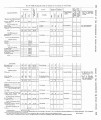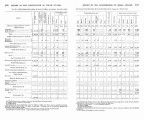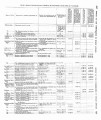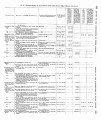| OCR Text |
Show portion of the Ogallala band, at the Red Cloud agency, end a consider-able body of disaffected Indians from all the bands, known as the L'hostile Siot~x," of whom "Sitting Bull" and "Alack Moou" are the principal chiefs, these bands are all within the limits of the reservation set apart bv said treatv of 1868. A few at each of the aeencies on the Missouri ~ gver'have shown a disposition to engage in agriculture, b"4 by,fGthe greater part of them remain L'breech-cloutn Indians, d~s~ncl~ntoe d iabor fofa living, and accepting srtbsistence from the &overnment as the natural and proper oonsideratiou for the favor done the Government by their eousenting to remain at the agencies assigned them. If the,y have any suspicion that this thing cannot last forever, and that the time will soon come for them to work or starve, the great majority do not allow themselves to be influenced by it, but seem determined to pnt the evil day as far off as possible. Tile present cost of supportiug these 26,000 Indians does not fall much short of $1,500,000 per annuln, an ex-penditure the continuance of which beyond the treaty provisions to that eeect (expiring in 1874) could ouly be jnstified by such eonsidera- . tions as were urged in the first pagesof this report. It must be remem-bered that the Gover~~mehnat s, more than once, spent in six.months in fighting the Sioux what it would cost at presentrates to support them for six years, while the present policy allows our railways and settle-ments to progress without practical obstruction. The reported attacks 011 the surveying parties and the stations of the Northern Pacific Rail-road during the summer and autumn, were really of the most contempt-ible character, and merely served to suggest the difficulties which this great national work would encounter if opposed by the whole fighting force of the Sioux na&ion?a s it would necessarily be but for the feeding system. Efforts have been and are still being made to induce the Ogal-lalas under Red Cloud to remove voluntarily to some place within the limits of their reservation, where their agency may be established, but as yet this has not been effected. Until this matter has been definitely settled, nothing can be done to advance this band in civilization. Under their treaty of April 29, 1868, these Indians receive annuities, &c., as follows: In clothing, (twenty-seven installments still due,) $159,400; beneficial objects, (twenty-seven installments still due,) $236,000; sub. sistence, including the Yankton Sioux and the Poncas, (one installment due,) $1,314,000; and to the ten persons who grow the best crops, (last appropriation made,) $600. They are also, by the terms of said treaty, furnished with blacksmiths. teachers., ~.h vsician.m iller. enaineer. and b , ., fiar~ner.a t all expcnse to thd (:orerume~tr ot'~l2,illo. b 1 ,;. I't,acna..-The I't~l~catin, ombering 73.5, ha\? n irseroation of 5;$,000 acrrs. wnr tho confl~~ettcofe the Siobrara and Mi~souriH i\.e~.$i,l l the sout.hiastern part. of the Territory, provided for them in their treaty with the United States, made in 1868. They are quiet and peaceable, are inclined to be industrious, and engage to some extent in farming; but from various causes, principally the destruction of their crops by grassl~oppers, have not succeeded in supporting themselves without assistance from the Government. They are well advanced in civilized habits of life, a6d have shown considerable interest in the education of their cliildren, having three schools in operation, with an average attendance of 77 scholars. By the treaty of March 12, 1868, ,they receive limited annuities, &c., as follows: $AO,ODO,* which is p a ~ dt o them in money or expended for their benefit, and $3,500 (during the -v leasure of the President) for aid in ag- ricultural and mecl~a~~ip.cua rl- But one further installment of their $10,000 annnity remains doe, after which they -will become entitled by treaty to an annuity of $8,000 for the term of fifteen yeara. |



































































































